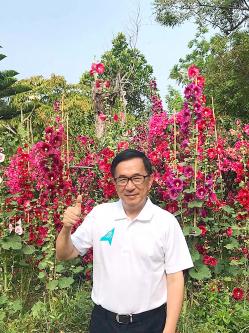Taiwan must soon hold a referendum on the issue of independence, former president Chen Shui-bian (陳水扁) was quoted as saying by a Japanese daily in a front-page article yesterday.
The nation faces a serious crisis due to strong pressure from China and must hold a referendum to clearly demonstrate that the public “does not want to be a part of China,” Chen was quoted as saying.
Chen, who is not permitted to engage in formal interviews under the conditions of his medical parole, made the remarks at a seminar on Sunday. He was convicted on corruption charges in 2009, but was released on parole in 2015.
Reporters from the Sankei Shimbun spoke with Chen at the conference, which was also attended by the managing members of Taiwanese civic groups operating in Japan.
Beijing’s aggressive poaching of the nation’s allies is part of its attempts to wipe out all traces of Taiwan’s existence, Chen was quoted as saying, adding that China could take military action against Taiwan at any time.
President Tsai Ing-wen’s (蔡英文) attempts to maintain the “status quo” in cross-strait relations demonstrate a defensive posture, but this approach is insufficient, he was quoted as saying.
Taiwan can only resist China’s military and diplomatic aggression through democratic methods, Chen was quoted as saying, adding that holding a referendum to let the international community know that Taiwanese “do not want [Taiwan] to be a part of China” would be the best way.
Asked by the reporters about the charges on which he was convicted, Chen reportedly criticized the “two presidents who came after him,” saying that he was “forced to go to prison for reasons that did not make sense” and that it was a “cross” he must bear for the sake of Taiwan’s democratization.
Chen was leaning on a cane and looked feeble when the reporters first arrived, but appeared to be filled with energy when he began discussing the nation’s future, the newspaper said.
The then-Chinese Nationalist Party (KMT) government placed several restrictions on Chen when he was granted parole, such as prohibiting him from engaging in political activities, the Sankei Shimbun said, adding that when Tsai was elected, she saw Chen as a political opponent, despite both being members of the Democratic Progressive Party (DPP), and did not grant him amnesty.
DPP supporters have been disappointed with Tsai’s apparent helplessness in the face of Chinese pressure and have expressed a desire for Chen to return to office, the newspaper said.
Chen has spoken with the media on Facebook through the alias Yung-ko (勇哥), the name of his dog, which the Tsai administration has “had no choice, but to tacitly approve,” it said.
While Tsai is an academic-turned-politician, Chen was a grassroots democracy activist who was imprisoned in his youth, the newspaper said, adding that his experiences mean Chen is not afraid to face China.
The state of China-US relations and a trade war between the two countries have created a good opportunity for Taiwan to strengthen its ties with Washington and raise its international statute, Chen was quoted as saying.
However, Taiwan must also be aware that it is foremost a “card for the US to play against China,” and it should not have overly high expectations of the administration of US President Donald Trump, he was quoted as saying.
While Taiwan-Japan ties have been good under Japanese Prime Minister Shinzo Abe, Tsai has not responded positively enough toward Japan, Chen was quoted as saying.
Regarding cross-strait ties, Chen reportedly criticized former president Ma Ying-jeou (馬英九), saying that he “left the door wide open” for China to accelerate its “annexing of Taiwan.”
Ma’s meeting with Chinese President Xi Jinping (習近平) in Singapore in November 2015 was “simply Ma putting on a show and did nothing good for Taiwan,” Chen was quoted as saying.
Asked about the Sankei Shimbun referring to the story as an “interview” with Chen, Taichung Prison Deputy Warden Lee Chin-kuo (李進國) said that from his initial understanding, Chen did not accept an interview, but accepted an invitation to attend the event to “talk.”
The prison does not plan to take any action on the issue at the moment, he said.
Additional reporting by Chang Jui-chen
Source: Taipei Times - 2018/09/06





















